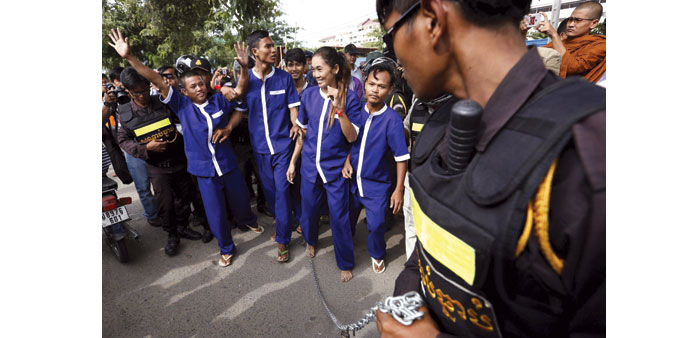Police officers detain protesters who tied themselves with long chains to their feet and wore prison uniforms.
AFP/Phnom Penh
Cambodian authorities briefly detained six demonstrators yesterday as they protested against the recent passage of a controversial law regulating non-governmental organisations, officials and a rights group said.
The five men and a woman were among dozens who rallied outside parliament in the capital Phnom Penh.
Critics say the law will hinder the ability of NGOs to operate in the deeply impoverished nation.
Those who were detained had dressed themselves in prison uniforms and chained their feet together, an AFP photographer said. Riot police chased other demonstrators away from the parliament building.
“The six people were arrested during a rally to express their opinion against the law,” Am Sam Ath, of local rights group Licadho, told AFP.
They were later released without charge after promising “not to do anything illegal and to be good citizens”, he added.
Long Dimanche, a spokesman for Phnom Penh City Hall, confirmed the arrests and said police detained the group because “their activities are inappropriate and are not allowed by the law”.
Cambodia is home to some 5,000 NGOs, many of whom provide key services, particularly for the poor majority.
Rights groups, Western diplomats and the UN have criticised the new legislation which has been pushed by the strongman prime minister Hun Sen.
Under the new law, which was passed earlier this month, all domestic and international NGOs must report their activities and finances to the government.
Failure to comply will result in fines, legal action, bans and “other criminal punishment”.
NGOs can also be disbanded if their activities “jeopardise peace, stability and public order or harm the national security, national unity, culture, and traditions of Cambodian society”.
The law was passed in both legislative houses despite a boycott by the main opposition party and a string of vocal protests.
It still needs to be signed off by the monarch -- a step that is all but a formality.
Hun Sen, one of the world’s longest-ruling leaders, marked three decades in power in January. He is regularly criticised by campaigners for stamping out dissent.

